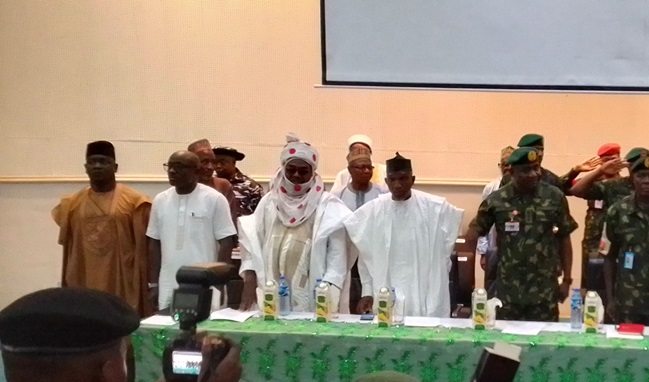The Chief of Defense Staff (CDS), General Christopher Gwabin Musa, has identified the ECOWAS protocol and complexities of managing Nigeria’s borders as part of the major challenges to national security in Northern Nigeria and the country.
The CDS listed others including an erroneous perception that security is solely for uniformed personnel, lack of patriotism, and low human index among others.
He made this known on Friday when he presented a paper ‘Assessing the Present Security Situation in Northern Nigeria” at the dialogue lecture series organized by the Institute for Development Research and Training, Ahmadu Bello University, Zaria.
According to the CDS, “Nigeria has 364 approved international border points and 1,497 other illegal migration points into the country. Further to this, Nigeria is a signatory to the ECOWAS Protocol on free movement of persons, goods and services within the West African sub-region.”
However, he posited that the obligation to abide by the ECOWAS Protocol on free movement coupled with the nature of border management, further instigates challenges to the nation’s security.
General Musa noted, “This has manifested in increased insurgency, terrorism and religious extremism, as well as the proliferation of small arms and light weapons, human and drug trafficking amongst others in the country.”
The Defence Chief further said the underlying causes of these complexities could be attributed to the inadequacies in the implementation of frameworks for our border management systems as well as structures to adapt to systemic changes.
“Equally, the impact of these complexities on Nigeria’s national security particularly in the Northern parts of the country has brought to the fore the need to improve our border control measures and overall architecture to provide a more effective system that would improve the check of illegal entry through our borders.
This, he argued, “we need to continue our collaboration with political leaders and relevant stakeholders in the implementation of essential protocols and action plans towards strengthening our border management systems for improved national security.”
He also said currently, there is an erroneous perception of security being the responsibility of only the military, pointing out, “This has greatly affected the ability to address security concerns in the north.”
Also, he identified a lack of patriotism as another factor undermining security in the North, saying, “Some unpatriotic citizens continue to undermine the unity and security of Nigeria.” This, he said, has continued to aggravate the fight against insecurity.
“The French political scientist and historian Alexis Charles Henri Clerel de Tocqueville defined patriotism as instinctive love towards one’s own country and this represents the primary bond an individual internalizes which causes him or her to be committed to the people within the territorial community.”
To this end, he maintained that being a civic duty, this love is missing in those individuals who keep sacrificing the common good and the well-being of the larger population including committing various atrocities for personal pecuniary gains.
“To ensure adequate security, all citizens must be involved in the business of security. Until this is internalized, the security agencies which are significantly less than one percent of the population will struggle to fill the massive gaps in the security architecture.
“The curriculum in our schools and institutions of learning as well as well as nurturing from parents and guardians must continually stress the importance of individual and collective civic responsibility to the safety and wellbeing of all.
“Individuals therefore need to watch out for the good of others and pursue well-defined national security interests. Accordingly, people must be conversant with actions to be taken and who to report unusual occurrences to as part of their responsibility to national security.
“Low human capacity index is another major factor affecting the security situation in the north. Human capacity index refers to the level of investment of a state in its people in terms of education, health and social services.
“According to the United Nations Development Programme, the current average Human Capacity Index for Nigeria is 0.548 with the states having the lowest Human Capacity Index in Nigeria being from Northern Nigeria. This indicates that the attention given to education, health and social services is this part of the country is quite low.
“This trend in turn could be linked to the requirement for good governance and people-centric policies to enhance the socio-economic conditions of the people in the north. Achieving a high Human Capacity Index would therefore be underpinned by transparency, non-discrimination, minimized corruption and efficiency of governmental policies.
“The seeming distrust in the relationships between government and the people negatively affects patriotism, and willingness to place common good over personal interest. It is in this regard that accountability to citizens across all strata of government remains paramount to ending insecurity in Northern Nigeria.”
The CDS, VC ABU, and other guests at the event
READ ALSO FROM NIGERIAN TRIBUNE
